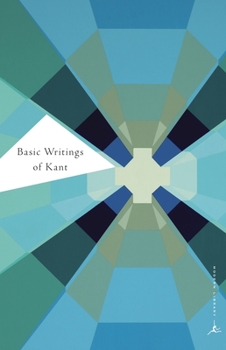Basic Writings of Kant
Select Format
Select Condition 
Book Overview
Introduction by Allen W. Wood With translations by F. Max M ller and Thomas K. Abbott The writings of Immanuel Kant became the cornerstone of all subsequent philosophical inquiry. They articulate the relationship between the human mind and all that it encounters and remain the most important influence on our concept of knowledge. As renowned Kant scholar Allen W. Wood writes in his Introduction, Kant "virtually laid the foundation for the way people...
Format:Paperback
Language:English
ISBN:0375757333
ISBN13:9780375757334
Release Date:July 2001
Publisher:Modern Library
Length:512 Pages
Weight:0.89 lbs.
Dimensions:1.2" x 5.2" x 8.0"
Customer Reviews
3 ratings
Kant the philosophical revolutionary
Published by Thriftbooks.com User , 18 years ago
This is an excellent survey of Kant's groundbreaking constributions to epistemology and moral philosophy. I would, however, support Karl Popper's observation that the best way to understand the transcendental idealism of Kant is to first study Schopenhauer. An ideal introduction to Schopenhauer (and Kant) is Bryan Magee's 'The Philosophy of Schopenhauer'. Then read Schopenhauer's 'On the Fourfold Root of Principle of Sufficient Reason', and then his 'The World as Will and Representation'. Schopenhauer is a peerless prose stylist and conceptual architect and he explains the philosophy of Kant (and it's limitations) better than Kant does himself. Once you have familiarised yourself with Schopenhauer, Kant's comparatively opaque and desultory prose (with occasional flashes of brilliance) is readily accessible. Kant's staggering intellectual achievement in moving beyond the apparent epistemological dead end of Hume is sufficient motivation for making the effort to read the Critique of Pure Reason. In the other works in this volume Kant developed his (in my view)flawed moral philosophy, based as it is on the supposed sovereignty of reason over the will - with its famous 'catagorical imperative'. While this is less impressive than his epistemology, it is still interesting and well worth reading. The translations offered here are clear and the selections from Kant's works are judicious. Altogether a great book at a great price, which will richly reward the serious reader.
An effective compilation, with all of the essays necessary for a basic understanding of Kant.
Published by Thriftbooks.com User , 18 years ago
With a thourough reading of this text, it is entirely possible to extract, not just the jist, but a fundamental understanding of the philosophy of Kant. Although it is true that no compilation of writings, which is forced to express the ideas of a philosopher such as Kant in a manageable way, can provide an understanding required for a masters or doctoral thesis, the Basic Writings of Kant is translated in such a way and contains the necessary essays for higher-level undergraduate understanding. By examining the development of Kant's ideas throughout each essay, it is possible to understand the unity of metaphysical, empirical, and moral concepts in a digestable and useful way. Although one may see fault in Kant's philosophy regarding any of these facets, this text provides the means for an understanding of Kant's philosopy and solid ground by which to dispute his ideas. One distinction, which might be useful in reading this text, is to note that the essay "Critique of Practical Reason" is better understood as the "Critique of (Pure) Practical Reason". It should be understood that Kant felt that the boundaries in which both practical and theoretical reason, lie is within the limits of the mind itself. Also, regarding Kant's chauvinism, a close reading of "What Is Englightenment?", might shed some light on those who seem to have heard what they wanted to hear in his referrence to the "fairer sex". Aside from that passage, I can not actually think of another example of his even mentioning gender differences. Feel free to correct me, if you can provide me with some new information, or something that I've forgotten.
Good anthology.
Published by Thriftbooks.com User , 20 years ago
This section of Immanuel Kant met my needs. It had the selections of Kant's writings that I needed, and all under one volume. I congratulate the editors for including references to the original works in the margins. This makes their edition useful as a stepping stone for studying the larger books.As to the translation, it was readable, which is the best that can be expected from Kant. The Prussian philosopher is notorious fro his run on sentence, subordinate and sub-subordinate clauses, and abstruseness. He would give Strunk and White a heart-attack. With this caveat, I found the translation a readable as humanly possible.*Since this review is about the book, rather than the content of Kant's philosophy, I will not extensively comment on it. With his "Critique of Pure Reason," Kant asserts that our mind affects our perceptions. In other words, reason is in doubt. This statement is self-contradictory, and therefore invalid. If we doubt our minds, then we must doubt the conclusion that we doubt our minds, since our mind reached this conclusion.Kant is the father of modern skepticism, and the godfather of relativism. As demonstrated, relativism is an incoherent, and therefore unlivable philosophy. Thank you, Immanuel!Secondly, his "categorical imperative" is ineffective. He appeals to duty, but duty is not an irreducible primary. The duty is always in relation to either self, to others, or to God. Secondly, duty is merely a means, but it is not an end in itself. What is the "telos" of duty? No explanation.






